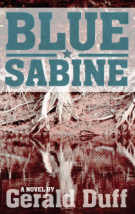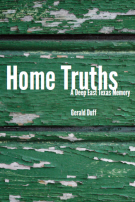|
Appearances
|
|
Wednesday, 05 September 2012 00:00 |
|
Gerald Duff to Present Blue Sabine at the Southern Festival of Books, October 13, 2012
 Meet Gerald Duff when he presents his novel Blue Sabine at Humanities Tennessee's 24th Annual Southern Festival of Books: A Celebration of the Written Word. The presentation will take place from 4:00 to 5:30 pm on October 13, Legislative Plaza, Room 16, in Nashville, TN, with a book signing to follow. The festival, which will run from October 12 to 14, 2012, is free, and no registration or tickets are required. For more information about the festival, including travel options, click here. Meet Gerald Duff when he presents his novel Blue Sabine at Humanities Tennessee's 24th Annual Southern Festival of Books: A Celebration of the Written Word. The presentation will take place from 4:00 to 5:30 pm on October 13, Legislative Plaza, Room 16, in Nashville, TN, with a book signing to follow. The festival, which will run from October 12 to 14, 2012, is free, and no registration or tickets are required. For more information about the festival, including travel options, click here.
To view the venue for the Southern Festival of Books on Google Maps, click here.
|
|
|
News
|
|
Monday, 03 September 2012 00:00 |
|
Dirty Rice: A Season in the Evangeline League Reviewed on Acadiana LifeStyle.com
 Dirty Rice: A Season in the Evangeline League was reviewed by Melissa G. Teutsch in Acadiana LifeStyle on August 31, 2012. The review, in its entirety, is reprinted below. Dirty Rice: A Season in the Evangeline League was reviewed by Melissa G. Teutsch in Acadiana LifeStyle on August 31, 2012. The review, in its entirety, is reprinted below.
DIRTY RICE
By Gerald Duff
UL Press $20
Baseball fans that remember the Evangeline League will be flooded with memories reading this historical fiction novel. Begun in 1935 the league included, among other cities, the New Iberia Cardinals, Lafayette White Sox, Opelousas Indians, and the Rayne Rice Birds. The Birds recruited Gemar Batiste who quickly became the team's star player. Only problem was Gemar was different, an Alabama-Coushatta Indian, who was asked to play the stereotypical Indian and even, asked to cheat. That went against the grain for him as he saw the diamond as a sacred place of honor named in honor of Longfellow's heroine.
This is a warm and humorous story with all the flavor of non-fiction.
To read the review online, click here. |
|
News
|
|
Friday, 03 August 2012 00:00 |
|
Home Truths: A Deep East Texas Memory Reviewed on Chapter16
 Home Truths: A Deep East Texas Memory was reviewed by Ralph Bowden on August 2, 2012, on Chapter16. Mr. Bowden writes: Home Truths: A Deep East Texas Memory was reviewed by Ralph Bowden on August 2, 2012, on Chapter16. Mr. Bowden writes:
The Impoverishment of Truth
Gerald Duff's memoir explains the nourishment and necessity of lies
Gerald Duff grew up in East Texas, in both the Gulf Coast petrochemical strip and the logged-out piney woods north of there. As he describes the area, it was hardly a hotbed of literary stimulation in the years during and after World War II. Nor was Duff's family exceptional or especially nurturing of his talents. But wherever his gifts for reading and writing came from, they were clear to Duff from an early age; he knew what he was suited for. Except for the two years he spent struggling in an electrical-engineering curriculum, he pursued literature at every opportunity through college, graduate work at prestigious schools, and faculty appointments, including stints at Vanderbilt University in Nashville and Rhodes College in Memphis. His memoir, Home Truths: A Deep East Texas Memory, takes him from his unlikely origins through a career as both an academic and a writer of poetry, short stories, and novels.
This is a likeable story, full of ordinary people in all their variety: relatives, most of them born, unlike Duff himself, with no genetic advantages; unsuitable girlfriends; a schizophrenic first wife; a second too driven to be a wife; a third and current wife who suits the role in every way; two successful children; and lots of colleagues, professors, and other academics, with various bees in their bonnets. Duff reveals how he borrowed from their lives and used many of their traits in his fiction.
Duff's description of his six years at Vanderbilt focuses on its tensions, traditions, and prejudices, sparing no one—neither the imported Ivy League chairman who hired him nor the older members of the department who resented the new chairman and everyone he hired. "I did not belong at Vanderbilt," Duff finally realized. Too low-born to make the expected social grade, he did nothing to improve his standing, drifting "into friendship with the closet homosexuals in the department and the one Jew." Perhaps unsurprisingly, Duff's time at Vanderbilt ended in disaster: the loss of his job, his marriage, and his children and all of it topped off by bankruptcy.
Eight years at prestigious Kenyon College in Ohio were a great improvement: "The English Department was the largest and best at the college, attracting the best students who, for the most part, read what they were assigned, wrote well, and considered themselves to be where they belonged," he writes. During these years, he managed to reclaim his children, but Duff's second wife insisted they move to a big city, where she could pursue her own ambitions. Soon after he landed a deanship at Rhodes (then called Southwestern at Memphis) the marriage failed anyway. As a dean, he soon learned the value of dissembling: "The lie is the coin of the realm in higher education management." His new position allowed plenty of time to write, however, and Memphis provided much grist for the writer's mill.
Throughout the book, Duff develops a theme of creative and spontaneous lying. Manipulating the truth saved him from many a childhood switching, maintained his image among his peers, allowing him to succeed as a dean. "Sometimes a lie is the best friend you can have," he writes. "I spent a lifetime depending on what not telling the truth will do to get me by."
To read the review online, click here. |
|
|



